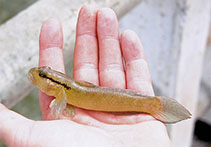| Family: |
Gobiidae (Gobies), subfamily: Gobiinae |
| Max. size: |
10 cm SL (male/unsexed) |
| Environment: |
benthopelagic; freshwater; brackish; marine; depth range 0 - 6 m, amphidromous |
| Distribution: |
Asia and Oceania: India, Hong Kong, Malaysia, Indonesia and Australia. |
| Diagnosis: |
Dorsal spines (total): 6-7; Dorsal soft rays (total): 11-12; Anal spines: 1-1; Anal soft rays: 9-10. Characterized by pale grey to brownish body color grading to white on lower half; dark brown scale margins forming honeycomb pattern; presence of narrow dark brown to blackish stripe from rear edge of eye to above base of pectoral fin; dorsal and lower part of caudal fins with dark spotting; fully united pelvic fins with well developed frenum; rounded caudal fin, about equal to head length; longitudinal scale series 32-38; predorsal scales 12-16, reaching interorbital space; ctenoid body scales, becoming cycloid anterior to pectoral and pelvic fins; scales absent on cheek, 1-2 rows on anterodorsal part of operculum; depth of body 4.7-6.4 in SL (Ref. 90102). |
| Biology: |
Inhabits sand or mud bottoms of estuaries and sheltered shoreline reefs in 0-6 m (Ref. 90102). |
| IUCN Red List Status: |
Not Evaluated (N.E.) Ref. (130435)
|
| Threat to humans: |
harmless |
Source and more info: www.fishbase.org. For personal, classroom, and other internal use only. Not for publication.
